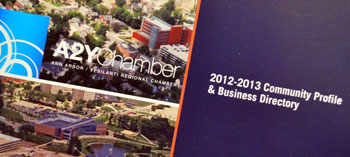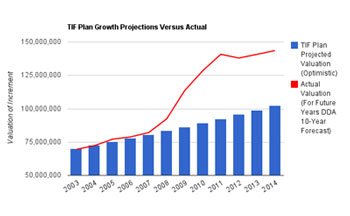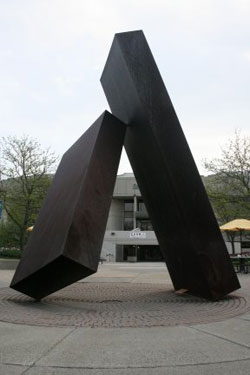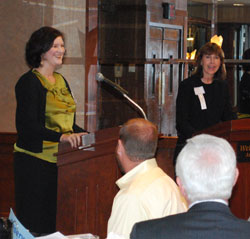Washtenaw County board of commissioners meeting (Feb. 19, 2014): A broad community planning process for the future of Platt Road property owned by Washtenaw County is moving forward, after the county board approved a set of recommendations made by a citizens advisory group.
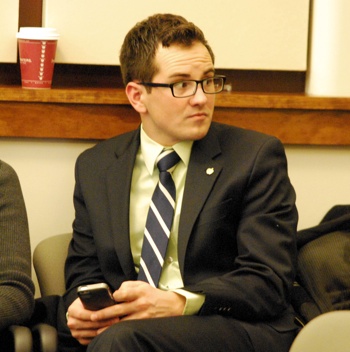
Jason Morgan, director of government relations for Washtenaw Community College, was appointed to the county’s community action board during the Feb. 19 meeting of the county board of commissioners. (Photos by the writer.)
The vote was unanimous, but came after Ronnie Peterson (D-District 6) raised concerns about the affordable housing component of the project. The planning process will use a $100,000 grant from the Michigan State Housing Development Authority (MSHDA), with a stipulation that planning for the 13.5-acre property – south of Washtenaw Avenue – include consideration of affordable housing.
When debate was cut short through a procedural move, Peterson criticized commissioners for not spending more time on the topic – though it had been discussed at length during the board’s Feb. 5, 2014 meeting. Andy LaBarre (D-District 7), who is helping to lead the project and who serves as chair of the board’s working sessions, indicated support for discussing it further at an upcoming session.
Peterson also voiced concerns about a new Act 88 advisory committee, which resulted in a postponement of the first appointment to that group until March 19. The committee had been created at the board’s Nov. 6, 2013 meeting, as part of a broader policy to help the board allocate revenues levied under Act 88 of 1913. No appointments have been made, however. The county levies the tax to fund economic development and agricultural activities, including Ann Arbor SPARK.
As he has in previous board discussions, Peterson expressed concern that the board was abdicating its responsibility to allocate funding. Other commissioners assured him that the committee will deliver recommendations, but the board retains authority for making the allocations.
In other action, the board gave authority to the Washtenaw County clerk/register of deeds office to reduce the fee for expediting marriage licenses under certain circumstances – from $50 to 1 cent. The vote came over dissent from Kent Martinez-Kratz (D-District 1), who argued that fees should be applied equally to all applicants – whatever the amount. He also didn’t think the criteria for applying the waiver were clear. County clerk Larry Kestenbaum cited some examples of when this fee reduction might be used. As one example, he noted that the vital records office anticipates moving later this year to the space where the deeds office currently is, so the office will likely be closed for more than three days.
Kestenbaum also reported that last year, his office had anticipated that a lot of people would want to get married right away because of a possible change in the state’s same-sex marriage law. He said he announced at that time that he intended to waive the fee, but “my authority to do that has been questioned.” He subsequently looked at the state statute, which requires a fee to be set by the county board and charged – whether it’s $5, or $50, or 1 cent. “It’s your authority to do this,” he told commissioners.
During the Feb. 19 meeting, commissioners also gave final approval to create a new dental clinic in Ypsilanti for low-income residents, and heard public commentary regarding the importance of the GED (general education diploma).
Updates and communications included news that the Sharon Township board of trustees had passed a resolution urging the board to keep the road commission as an independent entity. At the county board’s Oct. 2, 2013 meeting, commissioners had created a seven-member subcommittee to “explore partnerships and organizational interactions with the Washtenaw County Road Commission.” State legislation enacted in 2012 opened the possibility of absorbing the road commission into county operations, which would give county commissioners direct control over funding and operations now administered by the road commission.
However, it’s unlikely that will happen. During a 2.5-hour meeting on March 1, the subcommittee voted to recommend that the duties and responsibilities of the road commission should not be transferred to the county board of commissioners. Alicia Ping (R-District 3), who chairs the subcommittee, told The Chronicle that she’ll be bringing the recommendation to the board at its meeting on March 5. [Full Story]





